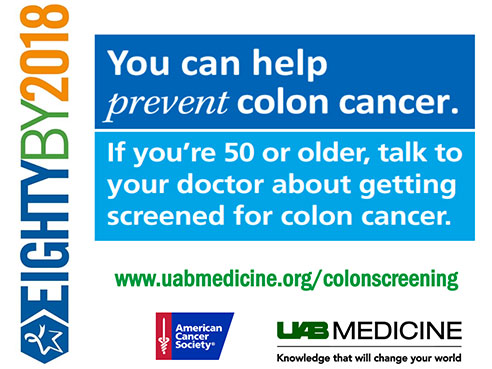 The University of Alabama at Birmingham is taking the lead as the largest employer in Alabama and a major academic medical center to encourage all of its employees who are eligible to get a colorectal cancer screening.
The University of Alabama at Birmingham is taking the lead as the largest employer in Alabama and a major academic medical center to encourage all of its employees who are eligible to get a colorectal cancer screening.
In partnering with the American Cancer Society as part of a national initiative, the overall goal is to eliminate colorectal cancer as a major public health problem by working toward having 80 percent of adults ages 50 and older regularly screened for colorectal cancer by 2018.
Colorectal cancer is the nation’s second-leading cause of cancer-related deaths in men and women combined. However, through proper colorectal cancer screening, doctors can find and remove hidden growths called polyps in the colon before they become cancerous. Removing polyps can prevent cancer altogether.
March is Colorectal Cancer Awareness Month, and UAB has formally kicked off its own “80 by 18” effort. UAB leaders President Ray Watts, M.D., CEO of the UAB Health System Will Ferniany, Ph.D., and director of the UAB Comprehensive Cancer Center Edward Partridge, M.D., have joined forces in a university wide effort to reach 80 percent of eligible UAB employees to get screened by 2018.
“As an academic medical institution, we collectively realize the importance of this initiative. This is a responsibility we have, but it’s also a real opportunity to save lives and be an example to our community and state,” Partridge said. “Colorectal cancer is one cancer that can actually be prevented and where screening can make the difference between getting cancer or not.”
In Alabama, a patient is diagnosed with colorectal cancer every 3.5 hours and someone dies of the disease every nine hours. Alabama has an estimated 392,100 people who should be screened. And based on data from UAB’s insurance carriers, it is estimated that UAB and UAB Medicine have more than 1,800 employees who should be screened.
“We can do better as a community and change these numbers. Some of the screening tests may seem daunting; but there are several acceptable methods that are simple, safe and widely used,” Partridge said. “People aren’t getting tested because they don’t believe they are at risk or don’t understand their testing options, or don’t think they can afford it.”
Employees who are eligible at UAB have been encouraged to educate themselves with detailed information, to speak to their physicians about their history and to inquire about the colorectal screening options that are available.
Common screening tests include a flexible sigmoidoscopy, colonoscopy, CT colonography or double-contrast barium enema. Other tests include a guaiac-based fecal occult blood test (gFOBT), fecal immunochemical test (FIT) or stool DNA test (sDNA test). In most of these cases, tests are performed every five to 10 years or, in a few cases, yearly. Some tests may require a copay depending on insurance; however, many public and private insurance companies cover the screening.
Employees can sign a pledge to show their commitment in the effort. Also, as a part of UAB Employee Wellness, they may log into My Heath Rewards to earn points three different ways:
- March 22 Lunch and Learn – Take Control of Your Health: Get Tested for Colorectal Cancer (500 points)
- Monthly Health Education /Colorectal Cancer Awareness Month – March 2016 (500 points)
- Colorectal Cancer Awareness Activity (1,000 points)
Employees will be provided updates and information on progress.
“We want to hammer home that this disease is highly preventable, detectable and treatable; but we need to take action,” Partridge said.